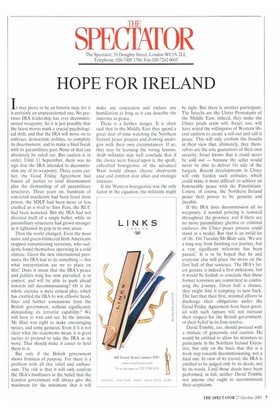HOPE FOR IRELAND
It may prove to be an historic step, for it is certainly an unprecedented one. No previous IRA leadership has ever decommissioned weaponry. So it is just possible that the latest moves mark a crucial psychological shift, and that the IRA will move on to embrace democratic politics, to complete its disarmament, and to make a final break with its paramilitary past. None of that can absolutely be ruled out. But caution is in order. Until 11 September, there was no sign that the IRA intended to decommission any of its weaponry. Three years earlier, the Good Friday Agreement had bound all parties to total disarmament plus the dismantling of all paramilitary structures. Three years on, hundreds of convicted murderers had been freed from prison, the SDLP had been more or less crushed as a rival to Sinn Fein, the RUC had been neutered. But the IRA had not divested itself of a single bullet, while its paramilitary structures had grown stronger as it tightened its grip in its own areas.
Then the world changed. Even the most naive and green-blinkered Irish Americans stopped romanticising terrorists, who suddenly found themselves operating in a cold climate. Given the new international pressures. the IRA had to do something — but what interpretation are we to place on this? Does it mean that the IRA's peace and politics wing has now prevailed, is in control, and will be able to push ahead towards full decommissioning? Or is the whole exercise a mere cynical ploy, which has enabled the IRA to win effusive headlines and further concessions from the British government, without significantly diminishing its terrorist capability? We will have to wait and see. In the interim, Mr Blair was right to make encouraging noises, and some gestures. Even if it is not clear what the statements mean, it is good tactics to pretend to take the IRA at its word. That should make it easier to hold them to it.
But only if the British government shows firmness of purpose. For there is a problem with all this relief and enthusiasm. The risk is that it will only confirm the IRA's hardliners in the belief that the London government will always give the maximum for the minimum; that it will make any concession and endure any humiliation as long as it can describe the outcome as peace.
There is a further danger. It is often said that in the Middle East they spend a great deal of time watching the Northern Ireland peace process and drawing analogies with their own circumstances. If so, they may be learning the wrong lessons. Arab militants may well conclude that if the choice were forced upon it, the spoilt, enfeebled bourgeoisie of the advanced West would always choose short-term ease and comfort over allies and strategic interests.
If the Western bourgeoisie was the only factor in the equation, the militants might be right. But there is another participant. The Israelis are the Ulster Protestants of the Middle East; indeed, they make the Ulster prods seem soft. Israel, too, will have noted the willingness of Western liberal opinion to create a sell-out and call it peace. This will only confirm the Israelis in their view that, ultimately, they themselves are the sole guarantors of their own security. Israel knows that it could never be sold out — because the seller would never be able to deliver his side of the bargain. Recent developments in Ulster will only harden such attitudes, which could make it more difficult to achieve an honourable peace with the Palestinians. Unless, of course, the Northern Ireland peace deal proves to be genuine and durable.
If the IRA does decommission all its weaponry, if normal policing is restored throughout the province, and if there are no more paramilitary ghettos or criminal enclaves, the Ulster peace process could stand as a model. But that is an awful lot of 'ifs'. On Tuesday Mr Blair said, We are a long way from finishing our journey, but a very significant milestone has been passed.' It is to be hoped that he and everyone else will place the stress on the first half of that sentence. The IRA's latest gesture is indeed a first milestone, but it would be foolish to conclude that these former terrorists are committed to continuing the journey. Given half a chance, they might find it tempting to turn back. The fact that their first, minimal efforts to discharge their obligations under the Good Friday Agreement have been greeted with such rapture will not increase their respect for the British government, or their belief in its firm resolve.
David Trimble, too, should proceed with a mixture of generosity and caution. He would be entitled to allow his ministers to participate in the Northern Ireland Executive, but only on the basis that this is a fresh step towards decommissioning, not a final one. In view of its record, the IRA is entitled to be judged only by its deeds, not by its words. Until those deeds have been performed, in full, neither David Trimble nor anyone else ought to decommission their scepticism.










































































 Previous page
Previous page